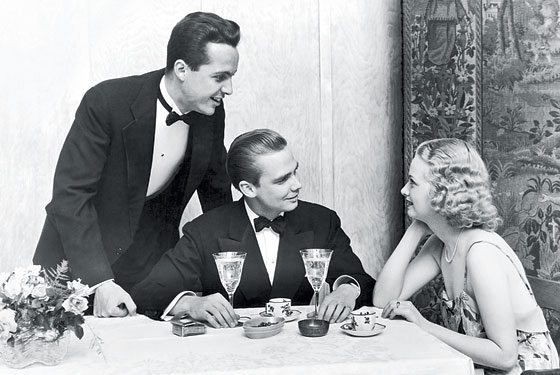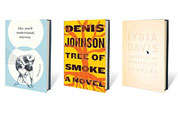
I usually prefer to be selective with my ironies—I like to parcel them out tastefully, subtly, unpredictably, like a playful summer rain lightly nurturing the wildflowers of early June. When someone asks me for directions to the local school for the deaf, I don’t automatically pretend I can’t hear the question. But this time it’s out of my hands. Owing to laziness, busyness, and a bogus holiday that shut down all the city’s mailrooms at the worst possible moment, I have been forced, very much against my will, into the most blindingly obvious irony I’ve ever been obliged to arch my inner eyebrows at: I have to start writing my review of Pierre Bayard’s How to Talk About Books You Haven’t Read without actually having read the book. I imagine that every other reviewer in America is, at this very moment, chortling into his tweed collar while pretending to do the same thing. But I’m telling you it’s really happening to me, and I’m unhappy about it.
Fortunately, the book’s absence from my life hasn’t prevented me, as a citizen of the United States of Amazonikipedia, from learning everything there is to know about it. I know, for instance, that Bayard, a respected literature professor, admits in the preface that he doesn’t enjoy reading, has little time for it, and lectures frequently on books he hasn’t read—scandalous revelations that helped make the book a sensation in Europe. I know, from a photo of the book, that it is small and blue. I know, from Bayard’s author photo, that he is fiftyish and improbably slim, and likes to dress entirely in black. In fact, in lieu of reading the actual book, I’ve spent a very long time scrutinizing this picture, which strikes me as a masterpiece of calculated faux-casual self-revelation: Bayard leans against a railing in front of a scenic spray of graffiti—a touch of vérité to anchor all the abstraction—and his eyes simmer like coq au vin, and his forehead bunches with a devastating whisper of wrinkle-cleavage (my God, he is about to think!), and he appears to be sucking on something, perhaps the word oeuvre. In short, he looks like a foot soldier in the vast army of impish popular intellectuals France has been training since the days of Roland Barthes, just in case the struggle for freedom should ever come down to the ability to wring paradoxes out of a stone or unriddle the world with Lacanian decoder rings.
I like to think of myself as a world-class literary faker. In second grade, in order to win some kind of certificate, I let everyone believe I had reached the end of an epic novel called The Wonderful Flight to the Mushroom Planet, when in fact its heroes had barely even met their first sentient fungi. I solidified this reputation one day in high-school English class, when, in answer to our teacher’s impossible question about an Ibsen play we hadn’t been assigned to read, I shouted, in a voice of casual authority, “Ghosts!” When this turned out to be correct (I had picked a random title from the list on the back cover of A Doll’s House), my classmates looked at me as if I’d spoken the secret of the universe, and they assumed I was fluent in Norwegian, and started whispering when I passed in the hall. A decade of college and grad school—boot camps of strategic fakery—immeasurably deepened my arsenal: Today I’m proficient in such feints as the stretched truth (“It’s funny, I’ve never actually finished that,” I’ll volunteer about War and Peace, of which I’ve read only the first paragraph), the misdirection (“Have you read Gravity’s Rainbow?” “You know what’s always bothered me about Pynchon?”), and, on very rare occasions, the enthusiastic flat-out lie (“Did you finish Brideshead Revisited?” “Yes! Yes, I really did!”). My signature move is a mildly orgasmic “Mmmmm,” which manages to suggest several things simultaneously: agreement, disagreement, ambivalence, and above all that my familiarity with the book in question is so deep it’s become muscular and sub-verbal, less a literary opinion than the visceral appreciation of a jaguar for the dawn.
But Professeur Bayard, a practicing psychoanalyst, is not so interested in practical tips. His goal is more ambitious: He wants to cure us of the deep cultural neuroses that govern our reading. His main argument, synopsized identically in reviews from here to Berlin, runs roughly as follows. Western culture has fetishized books almost as much as it has breasts and cash. Our reading is governed by a corrosive idealism that fills us all with secret shame: We believe we should be doing it more and better, and that, until we do, we fully deserve to be sneered at by college dropouts at the Strand. To Bayard, however, this is unrealistic. The line-by-line, cover-to-cover experience of a text, he argues, is passé; true reading consists mainly of nonreading. By this he means not just an absence of reading but a positive set of shadow skills that we should honor and cultivate and teach to our children: browsing covers and spines, reading first sentences, skimming key passages, monitoring gossip, and b.s.-ing at cocktail parties. Deep knowledge of a particular book, Bayard contends, is almost always less important than an understanding of that book’s position in a “collective library”—the imagined cluster of books to which it’s related. You’ll probably never need to know, e.g., that Leopold Bloom eats a Gorgonzola sandwich for lunch, but it might help to know that Ulysses is a long twentieth-century experimental novel by James Joyce, patterned on The Odyssey, and that it uses stream of consciousness to describe a day in the life of a handful of Dubliners. Bayard is the opposite of old-school canon-boosters like E.D. Hirsch and Harold Bloom, who equate a lack of knowledge about Shakespeare to a lack of opposable thumbs. In fact, he argues that ignorance of the details of Hamlet ultimately allows us to respond more creatively to the text—and therefore to be more fully ourselves.
The success of How to Talk About Books You Haven’t Read has made the book, no doubt to Bayard’s utter ecstasy, a perfect mise en abyme of nonreading. The central question it raises about every other book now applies equally to itself: Once a text whistles off into the slipstream of international hype, does it still need to exist? Or has our society, in its advanced stages of info-fluency, finally managed to do away with the thing itself?
By the time Bayard’s book got to me, I wasn’t sure what to do with it. I was already halfway done with my piece, and reading it at this point felt like a surrender to the repressive bourgeois book fetish that I’d just been thoroughly indoctrinated against by all the other reviews I’d read, not to mention a clear betrayal of the conceit in my opening paragraph. I set it aside, unopened, and tried to keep working. But the tiny Lutheran pastor who lives in my heart wore me down with a series of stern sermons about the sacred trust of book reviewing, and (since I’ve always kind of been into repressive norms) eventually I gave in.
It turns out that Bayard’s book benefits significantly from not being read. Although it’s witty and charming and often fun, it seems to have been designed for abridgment—it’s best when condensed into bullet points. Its argument is, despite all the psychoanalytic bells and whistles, pretty familiar. Is it news to anyone that we forget most of what we read, or that all reading is subjective? So to sensationalize matters, he consistently leans on the counterintuitive: Because we can read only a fraction of all the books published, he writes, “all reading is a squandering of energy.” The book’s tone is stranded halfway between a real work of social theory and satire—it’s Derrida crossed with “A Modest Proposal”—and this tension makes it hard to decide what’s really at stake.
Even Bayard’s personal revelation that he’s “read relatively little” turns out to be untrue: He told an interviewer that the book “is told by a fictional personality who boasts about not reading and is obviously not me. This is not a book written by a nonreader.” Under the guise of revolutionary honesty, he’s actually being dishonest.
My biggest gripe is that Bayard’s conception of reading is entirely social— a way to rack up points at cocktail parties. At the risk of sounding like the fusty old crank everyone does impressions of in the faculty lounge, I still believe in the private ecstasy of reading. It’s one thing to jockey for social position by saying that Dostoyevsky introduced psychology into the novel, or that Chaucer had a fuller grasp of humanity than Shakespeare. It’s another thing to experience, with your full attention, Raskolnikov wandering feverishly around St. Petersburg, or the young scholar farting in the face of his romantic rival in “The Miller’s Tale.” Real reading is not just hoarding fodder for cocktail chatter, it’s crawling, phrase by phrase, through a text and finding yourself surprised or disappointed or ruined or bored with every other line. This direct connection—the voice that enters your brain and mingles with your own internal voice—is the only way books really matter, and experiencing it requires a kind of deep surprise at the words in front of you. If anything, we’re already too good at talking about books we haven’t read. The challenge now is to preserve our ignorance.

SEE ALSO: How to Talk About Five National Book Award Nominees
How to Talk About Books You Haven’t Read
By Pierre Bayard. Bloomsbury USA. 208 pages. $19.95.